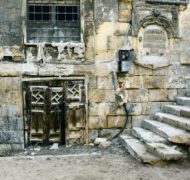Israel’s Systemic Breakdown (Ezekiel 22)
Bible Commentary / Produced by TOW Project
If the exiled Jews in Babylon missed the positive example in chapter 18, Ezekiel 22 gives them an explicit picture of where the nation went off the rails set by God. Jerusalem is the setting as the prophet looks at the political, economic and religious factors that led to its ultimate destruction. According to Robert Linthicum, the purpose of the political system is to establish a politics of justice and obedience to God (Deuteronomy 16:18-20; 17:8-18). The economic system is called to maintain an economics of stewardship and generosity (Deuteronomy 6:10-15; 15:1-18). The religious system is primarily responsible to bring people into a relationship with God and to ground the political and economic systems in God (Deuteronomy 10:12; 11:28). Religion provides the fences for the community and gives meaning to life. The political system provides the process, and the economic system supports the community. When the religious system gets out of order, everything else is up for grabs.[1] According to God's law, the disparity between rich and poor (wealth and poverty) is a direct indicator of a nation's or a community's distance from God.
In Ezekiel 22, the prophet now shows the exiled Jews why God's judgment on their nation must come: from the princes to the priests to the false prophets to all the people of the land, "you have all become dross" (Ezek. 22:19). God's patience has reached its end and the wages of every form of "business" sin will bring death and destruction on the perpetrators. What is included in this catalog of sins? The use of power to shed blood (Ezek. 22:6), treating parents with contempt, oppressing the foreigner and mistreating the fatherless and widows (Ezek. 22:7), slandering with a goal of shedding blood (Ezek. 22:9), sexual sins and harassment (Ezek. 22:11), charging interest and making a profit on the poor, extorting unjust gain (Ezek. 22:12), conspiring to ravage the people, taking treasures and many precious things and making many widows in the process (Ezek. 22:25), doing violence to the law, profaning holy things, teaching error and shutting their eyes to God's Sabbaths (Ezek. 22:8, 26), officials like wolves tearing their prey for unjust gain (Ezek. 22:27), prophets whitewashing these deeds (cover-up) with false visions and lying divinations (Ezek. 22:28), and the people of the land practicing extortion, robbery, oppressing the poor and needy, mistreating foreigners and denying them justice (Ezek. 22:29).
In the end, God looked for just one righteous person who would stand in the gap, but there was no one. It is this total disregard for righteous relationships that brings God's wrath and punishment. The chapter ends (Ezek. 22:31) with God removing his protective hand from the people as they self-destruct. How does God bring judgment? He lets the systems take their natural course without intervening. The downward spiral ends in destruction. A theology of work must lay out the honest and merciful practices God's people must follow (chapter 18). To disregard this is to court disaster.





